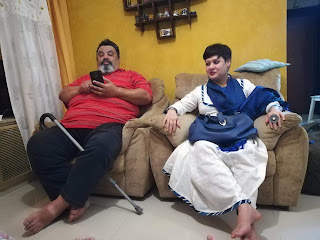History is intriguing and ever so
when it is related to Food. This month I was exposed to the Pathare Prabhu cuisine
which is not available commercially while it’s an integral part of Mumbai
culture. The Clan or community I am told
were one of the original settlers in Mumbai. The Kolis belonged to Mumbai while
the Prabhus arrived here. I was told that the origins could have been in Nepal
and then they traversed all the way to Mumbai imbibing a variety of influences
on the way be it Rajasthani or Gujarati.
Prabhu means Lord. Apparently
King Ashvapati of ancient times of the Dvapara and Treta Yuga was cursed by
Rishi Bhrigu that the empire and the people concerned would vanish from this earth.
However the full effect of the curse was reduced when the King apologised profusely
and the descendants went on to live (or still living) illustriously through Art,
culture, education and government employment. The name Patare is derived from
Patar – Letter writing in Marathi - and that’s what is chronicled by a lady named
Helena Petrovna Blavatsky in her memoirs who had visited India in the 19th
century.
There is also this story about
how the Peshwas used to dominate the Prabhus and under protest they imbibed food
techniques that are absolutely different from the typical Maharashtrian Fare. Desiccated
coconut is hardly used and instead coconut milk is prevalent. They have created/evolved
some unique combination of spices like the Pathare Sambhar Masala and their own
version of Methkut (combination of select pulses and other spices).
Yesterday I visited Soumitra
Velkar’s house in Oshiwara for a heady meal while last week I visited the
Vijaykars in Jogeshwari East. Cooking surely
differs from house to house and I will resist from making a direct comparison. The
best part of their food is the light touch in everything that they craft and
while the end products are extremely flavourful the alimentary canal is not
tortured one bit.
The Vijaykar’s first:
Sunetra and Shreekant live in
Gurgaon Delhi but the come down to Mumbai every quarter. They have been having
these meets in their home so that we may savour some of their delights. I did not
want to miss that opportunity.
The Menu and some close-ups:

I loved the Mutton Curry (Kalwan- Marathi) that interestingly they love to have with Chapatis. I could not
resist having rice with it. The sesame seed coated fresh Rawas fry compelled me
to request for a repeat. I liked the Gode Keri. The Karandiche Lonache (spicy
picked masala with shrimps) was brilliant and so were ripe jackfruit fritters which was a new to me.
The Pomphret curry was very light and I guess the Vijaykar’s have their own interpretation of the Bhujane (where
garlic, turmeric, onions and other optional spices are mashed with the fingers to
a smooth paste for making the curry).
Their quiet, quaint home is a peaceful place to enjoy food comfortably. I think you should try them for their fare.
 The second was at Soumitra Velkar’s
residence yesterday and I was plain and simply overwhelmed. The PPs are typically
inclined towards non vegetarian fare and Soumitra was the torch bearer of this practice.
The second was at Soumitra Velkar’s
residence yesterday and I was plain and simply overwhelmed. The PPs are typically
inclined towards non vegetarian fare and Soumitra was the torch bearer of this practice.
We
were greeted with the Kokum Sherbet that was spiked with Vodka to prepare us
for the goodies ahead. The first to arrive was the Pangoji (prawn fritters)
that was gobbled up quickly. This was followed with the typical Bombil Fry
while I fell in the love with the third item. The Mutton mince filling Shingdya
(sounds familiar with our Bengali Shingara but is shaped like a Karanji or our
Bengali Puli Pithe). The Ghol fish fry had to be repeated thrice!!The prawn tomato chutney and the prawn pickle were splendid accompaniments.
The first item at the dinner table was an impromptu grape salad with simple coriander, green chillies and rock salt. It was a good start before Mutton Gode with pav was served.
The “oh so soft” mutton was in this delectable gravy and I did show my weakness
in having some rice with it. We make a Fish Bone curries of Bhetki in Bengal
and I was not unfamiliar to the concept of Kaata Bhujana. The Bhujane or
Bhujana was taken to a spiral upward level of pleasure by Soumitra using the bones
of Ghol Fish... It was pure delight to sit at the dining table and expected to
break open the bone for the soft marrow. It felt just like home.

The Bombil Methkut (another spice
mix curry) and the Kolambi(prawn) Khadkhala were the next two arrivals and all
the sensory organs were totally engrossed with the items. The meaning of Khadkhala
is apparently the sound of shells rubbing against each other in the wok. So
technically we could have a crab Khadkhala too. Once the photography session
was over I finally gave up the spoon and started using my Bong hands.

 We ended with Kharvas (a colstrum
based pudding if you like) and I could not help having two portions of the
fantastic creation by Soumitra.
We ended with Kharvas (a colstrum
based pudding if you like) and I could not help having two portions of the
fantastic creation by Soumitra.
Since the location was near, I
walked back home with a delightful feeling. As I write this today, I feel like
going back to his house and demand for the leftovers!!
The motley group at Soumitra's house:















No comments:
Post a Comment